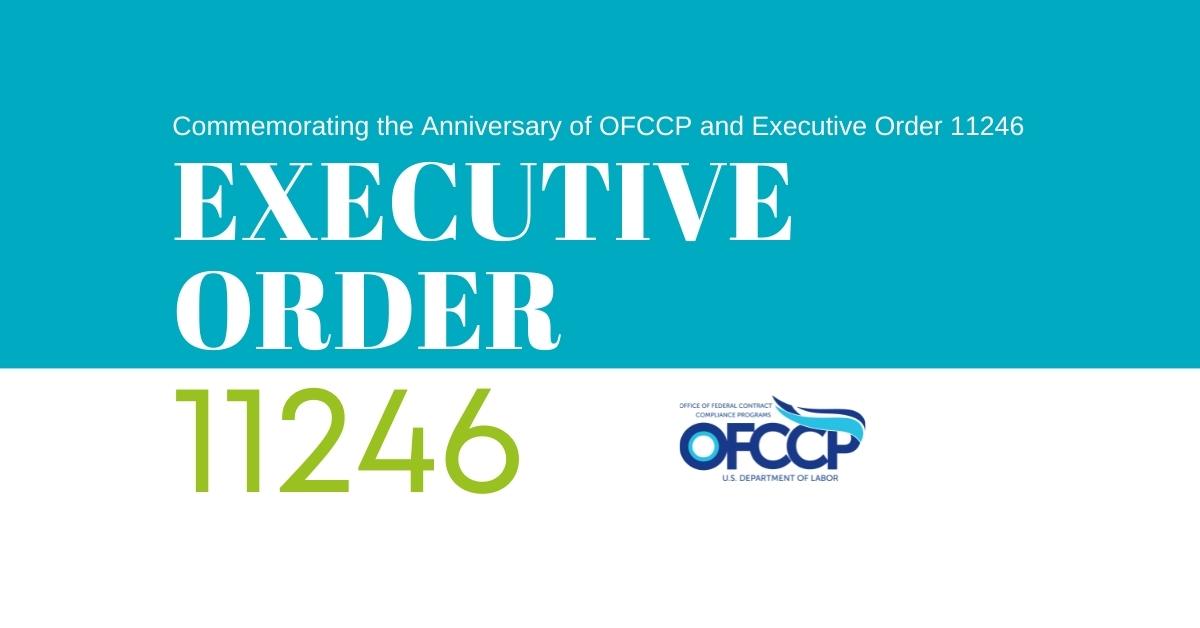Over the past half-century, OFCCP has helped define and defend equal opportunity in the American workplace. The origins of the agency can be traced back to President Franklin D. Roosevelt’s signing of Executive Order 8802 on June 25, 1941.
Executive Order 8802 was issued to prohibit federal contractors within the defense industry from discriminating on the basis of race or ethnicity and was implemented in part at the urging of prominent civil rights leaders, most noticeably A. Philip Randolph.
On September 24, 1965, President Lyndon Johnson issued Executive Order 11246, and soon thereafter, the Secretary of Labor established the Office of Federal Contract Compliance. Executive Order 11246, enforced by OFCCP, became a key landmark in a series of federal actions aimed at ending racial, religious, and ethnic discrimination. Today, Executive Order 11246, as amended, prohibits federal contractors from discriminating based on race, color, religion, sex, sexual orientation, gender identity, or national origin, and requires federal contractors to take affirmative action to advance equal employment opportunities. Contractors are also prohibited from discriminating against applicants or employees because they inquire about, discuss, or disclose their compensation or that of others, subject to certain limitations. The Institute of Workplace Equality produced a historical retrospective of the history of OFCCP and Executive Order 11246 for the agency's 50th anniversary. The video, featured at the National Civil Rights Museum in Memphis, Tennessee, can be viewed here.
To this day, Executive Order 11246 remains a major safeguard, protecting the rights of applicants and individuals employed by federal contractors, and opening the doors of opportunity through its affirmative action provisions.
OFCCP has taken several steps this year to ensure the promise of Executive 11246, as well as Section 503 of the Rehabilitation Act, and the Vietnam Era Veterans’ Readjustment Assistance Act (VEVRAA), including the release of guidance and resources:
-
- Effective Compliance Evaluations and Enforcement: OFCCP issued this Directive in March 2022 to provide transparency on OFCCP’s compliance evaluation policies and expectations for contractors.
- Advancing Pay Equity Through Compensation Analysis: OFCCP issued this Directive in August 2022 to provide guidance on how OFCCP will evaluate federal contractors’ compliance with their longstanding obligation to analyze compensation systems and document compliance pursuant to 41 CFR 60-2.17(b)(3) and clarify OFCCP’s authority to access and review documentation of compliance.
- Notification of Construction Contract Award Portal (NCAP): OFCCP launched a new online platform referred to as the Notification of Construction Contract Award Portal (NCAP) to modernize how the agency receives required notices about construction contract and subcontract awards.
- OFCCP Contractor Portal: The Contractor Portal is a new platform where covered federal contractors and subcontractors must certify, on an annual basis, whether they are meeting their requirement to develop and maintain annual AAPs.
- HIRE Initiative: OFCCP and the U.S. Equal Employment Opportunity Commission launched this joint initiative to reimagine hiring and recruitment practices in ways that advance equal employment opportunities and help provide access to good jobs for workers.
OFCCP conducts neutrally scheduled compliance evaluations to determine whether contractors are complying with the requirements established by Executive Order 11246, Section 503, and VEVRAA. From 2011 through 2021, OFCCP has obtained $206.5 million in total financial remedies for more than 270,000 federal contractor workers.
In addition, the agency is committed to providing contractors with compliance assistance and outreach, as well as resources. Contractors can find more information about our compliance assistance resources on our website at https://www.dol.gov/agencies/ofccp. We also conduct outreach to educate workers and applicants about their workplace rights.
OFCCP will continue to work tirelessly to eliminate workplace discrimination and will collaborate with federal contractors and stakeholders to build more inclusive and equitable workplaces.
Founded in 1998, OutSolve has evolved into a premier compliance-driven HR advisory firm, leveraging deep expertise to simplify complex regulatory landscapes for businesses of all sizes. With a comprehensive suite of solutions encompassing HR compliance, workforce analytics, and risk mitigation consulting, OutSolve empowers organizations to navigate the intricate world of employment regulations with confidence.
Recent Posts
Related Posts

Former DOL Officials Issue Open Letter to Federal Contractors
On April 15, 2025, ten former senior officials from the U.S. Department of Labor (DOL), including past leaders of the Office of Federal Contract...

The Ultimate Guide to Multi-State Labor Law Posters
Human Resources professionals understand how important and challenging it can be to remain updated and compliant with labor laws. This is especially...

Countdown: Final Days of the 90-Day Safe Harbor Period for AAPs
April is here and with that comes the end of the 90-day safe harbor period for federal contractors complying with EO 11246. As April 21, 2025,...



